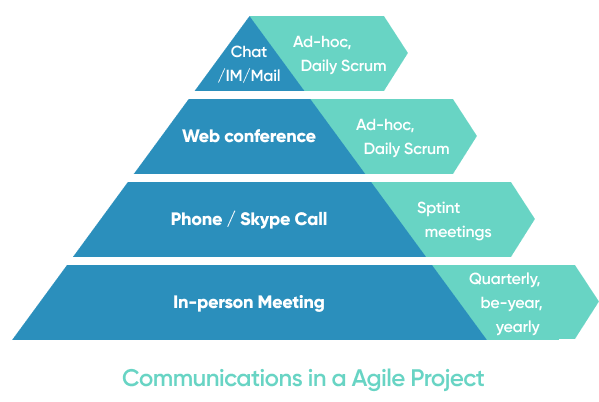If you’re a startup founder, the goal is always on to do more with less. You have to find a way to get your product to market quickly, efficiently, and effectively.
Software development services for startups can help you achieve your business goals faster and more efficiently. But it’s important to understand the development process before you dive in. By following these tips, you can shorten your development cycle, release your product sooner, and get a head start on your competition.
In this article, we’ll give you an overview of software development for startups, so you can build better product faster. Let's get started!
- Why do startups need fast software development process?
- Tips on how to speed up software development for startups
- 1. Focus on delivering value to your customers
- 2. Create a prototypes and proof-of-concepts
- 3. Use a lean and agile methodology
- 4. Don’t reinvent the wheel – use existing tools and APIs
- 5. Keep your codebase small and focused
- 6. Use automated testing to ensure quality
- 7. Keep in synchronized code and documentation
- What's next for fast software development for startups?
- Conclusion
Why do startups need fast software development process?
Startup is a small business that explores new business prospects while attempting to address a problem for which the answer is unknown and the market is very unpredictable. Being recently founded does not automatically qualify a firm as a startup. According to the studies, high unpredictability and fast evolution are the two key features of startups that distinguish them from more established businesses.
In today's business world, the ability to move quickly and adapt to change is critical to success. Startups need to be able to develop their products quickly and efficiently in order to stay ahead of the competition.

To comprehend why a startup requires rapid software development, one must be aware of the difficulties it faces:
- Extremely restricted financial, human, and material resources.
- Startups can respond rapidly to changes in the market validation, technologies, and product offerings compared to more established companies.
- Given the extremely competitive ecosystem, startups must concentrate on and investigate highly innovative business segments. The company's activities revolve solely around one product or service.
- Startups face a highly uncertain ecosystem from multiple vantage points: market, product characteristics, competition, people, and finances.
- The atmosphere frequently compels entrepreneurs to create products quickly and work under constant pressure (term sheets, demo days, investor requirements).
- Due to a lack of resources, startups rely extensively on external solutions to construct their products: external APIs, open source software, outsourcing, COTS, etc.
- Startups begin with a small group of people. The company was newly established. The initial failure rate is exceptionally high.
- A significant portion of the development team is comprised of individuals with less than five years of experience and frequently recent college graduates.
- Founders are typically the focal point of a startup, and every employee has significant responsibilities without the need for top management.
- Particularly in their infancy, businesses require external money to support their operations (venture capitalist, angel investments, personal funds, and so on).
Tips on how to speed up software development for startups
This article provides tips for developing software more effectively. It suggests creating a clear plan from the outset, using agile methodology, automating where possible, and keeping code clean and well-organized.
Focus on delivering value to your customers
Develop a clear and concise plan for your software development project from the outset. This will help to ensure that everyone involved understands the goals and objectives, and can work towards them more effectively. There is no one-size-fits-all answer to this question, as the best way to develop a clear and concise plan for a startup software company will vary depending on the specific company and its goals. However, some tips on how to develop such a plan include:
- Define goals and objectives - What does the company hope to achieve? What are its top priorities?
- Research the market and the competition - What is the current landscape of the industry? Who are the major players?
- Develop a business model, business analysis - How will the company generate revenue? What are the costs associated with running the business?
- Create a marketing plan - How will the company raise awareness of its product or service? How will it reach its target market?
- Create a financial plan - What are the company's start-up costs? How will it fund its operations? What are its long-term financial goals?
Create a prototypes and proof-of-concepts
There are many reasons for creating prototypes and proof-of-concepts for startups. Prototypes help startups to validate their ideas and to test the feasibility of their products or services - see MVP examples.
They also help startups to attract investment and to build partnerships. Proof-of-concepts are important for startups software development because they help to show the potential of the startup's technology or business model.

There is no one-size-fits-all answer to this question, as the best way to create prototypes and proof-of-concepts for a startup will vary depending on the specific product or service being developed, as well as the resources and expertise available to the startup team. However, some general tips that may be useful include:
- Keep it simple - When creating prototypes and proof-of-concepts, it is important to keep the design and functionality as simple as possible. This will help to ensure that the final product is not only more likely to be successful, but also easier and less expensive to develop.
- Focus on the core functionality - When developing a prototype or proof-of-concept, it is important to focus on the core functionality that is essential to the success of the product or service. This will help to ensure that the final product is able to meet the needs of the target market.
- Use readily available resources - When possible, it is always helpful to use readily available resources when creating prototypes and proof-of-concepts. This includes using existing platforms and tools, as well as leveraging the expertise of others.
- Test, test, test - It is important to remember that prototypes and proof-of-concepts are meant to be tested and refined. As such, it is essential to test the products or services extensively before moving on to the next stage of development.
Use a lean and agile methodology
Agile methodologies have been considered the most viable development process—they embrace change, allowing development to adapt to the business strategy.
Fast release with an iterative and incremental approach shortens the lead time from idea conception to production with fast deployment. A variant to agile is the lean methodology, which advocates the identification of the riskiest parts of a software business and provides a minimum viable product to systematically test and plan modification for the next iteration. In this regard, prototyping is essential to shorten the time to market.
To allow better prototyping activities, evolutionary workflows are needed to implement “soft-coded” solutions in the first phases until the optimal solution is found. Yet, the uncertainty and fast-changing needs of startups drive them to opportunistically tailor minimal process management to their short-term objectives and adapt to the fast-paced learning process of their users to address market uncertainty.

Don’t reinvent the wheel – use existing tools and APIs
There are a number of existing frameworks and tools that startups can use to build products faster. One example is online APIs. APIs can provide startups with a way to quickly connect to and access data from a variety of external sources. This can save startups a considerable amount of time and effort that would otherwise be spent on developing their own data connections and tools.
Another example of an existing framework that can be used by startups is a platform-as-a-service (PaaS) solution. PaaS solutions provide a complete development and deployment environment that can be used to quickly develop and launch new applications and services. This can be a particularly attractive option for startups that do not have the time or resources to invest in setting up their own infrastructure.
There are a number of other existing frameworks and tools that startups can use to speed up product development. These include open source libraries, application programming interfaces (APIs), and software development kits (SDKs). By making use of these existing resources, startups can significantly reduce the time and effort required to build new products and bring them to market.
Keep your codebase small and focused
As a startup, you need to move fast and release features quickly to stay ahead of the competition. But if your codebase is large and unfocused, it will slow you down.
Here are some tips on how to keep your codebase small and focused, so you can speed up software development:
- Keep your codebase small - The smaller your codebase, the easier it is to manage and understand. This makes it quicker to develop new features and fix bugs.
- Keep your code focused - Don’t try to build everything into your software. Focus on the essential features that your users need.
- Use a modular approach - Breaking your code into smaller modules makes it easier to manage and understand. This will also make it easier to reuse code in future projects.
- Write clean code - Write code that is easy to read and understand. This will make it quicker to develop new features and fix bugs.
- Keep your development environment clean - Make sure your development environment is clean and organized. This will help you to work more efficiently.
Use automated testing to ensure quality
Conduct regular testing throughout the software development life cycle. This will help to identify and fix any errors or bugs before the product (ex.: mobile apps) is released.
There are a few ways to conduct regular testing for startups:
- use unit tests to test individual pieces of code
- use integration tests to test how all components of the system work together
- use regression tests to test for bugs that have been fixed
- use performance tests to test how the system responds to load
Regular testing by startup is important because it helps to ensure that the product is functioning properly and that the company is able to identify and fix any issues that may arise. Additionally, it allows startups to track their progress and ensure that they are meeting their goals.
Keep in synchronized code and documentation
If you have ever worked on a project where the code and documentation live in different places, you know how frustrating it can be. Out-of-sync documentation is one of the most common problems that teams face.

When code and documentation are in different places, it’s easy for them to get out of sync. This can lead to a number of problems, such as:
- documentation that is outdated or inaccurate
- a lot of wasted time trying to keep the documentation up-to-date
- a feeling that the documentation is not trustworthy
Keeping code and documentation in sync is important for a number of reasons:
- it ensures that the documentation is always accurate and up-to-date
- it saves time, because there is no need to constantly update the documentation
- it builds trust, because the documentation is seen as being accurate and trustworthy
There are a number of ways to keep code and documentation in sync, such as using a tool like DocSync or keeping the two files in the same repository. Whichever approach you choose, the important thing is to make sure that code and documentation are always in sync.
What's next for fast software development for startups?
Assuming you are asking what the future of fast software development for startups is, here are a few potential trends:
- More startups will embrace the lean startup methodology and validate a product idea before going all-in on development with MVP developers.
- Automation will continue to play a big role in helping startups move quickly, with tools like continuous integration and deployment becoming more commonplace.
- Startups will increasingly adopt microservices architectures to allow for more flexibility and quicker development times.
- Collaboration and communication tools will become even more important as startups look to work more efficiently.
- Data engineering companies will become an even more critical asset for startups, with those that are able to harness it effectively gaining a significant competitive advantage.
Conclusion
Outsourcing software development for startups can be a great way to keep up with the ever-changing landscape of technology. By partnering with a custom software development company, time pressure and lack of resources will no longer be an issue. This will you stay ahead of the competition and maintain a successful business growth.
A software development partner can help you achieve your business goals faster and more efficiently. By following these tips, you can shorten your software development life cycle, release your product sooner, and get a head start on your competition.







